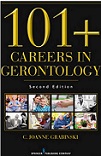In 1990 the United Nations designated October 1 as the International Day of Older Persons to educate the public, raise awareness, and celebrate the older segment of the population. The portion of the population that is over 60 is growing fast, and it is expected to grow by 46% between 207 and 2030. As the UN’s webpage for this day says, this may be “one of the most significant social transformations of the 21st century.”
As university students prepare themselves for future careers, this trend may be something to consider. The U.S. Census Bureau projects that by 2030 1 in 5 people in the United States will be at least 65 years old. That’s a lot of people consuming goods and services, and affecting our economy, health care system, politics, workforce, educational system, and more.
 Would you like to learn more? UW-Whitewater’s Libraries may be able to help, with books such as 101+ careers in gerontology (3rd-floor Main Collection, HQ1064.U5 G66 2015), Quality in ageing and older adults: Promoting excellence in services through research, policy and practice : Older people as voters, citizens and changemakers (online via ProQuest Ebook Central) and many articles including “Why older workers work beyond the retirement age: A qualitative study” (BMC Public Health, 2017, vol.17:no.1, pp.1-9), “A social work perspective on how ageist language, discourses and understandings negatively frame older people and why taking a critical social work stance is essential” (British Journal of Social Work, 2017, vol.47:no.7, pp.2068-2085), “Multidimensional comparison of countries’ adaptation to societal aging” (Proceedings of the National Academy of Sciences of the United States of America, 2018, vol.115:no.37, pp.9169-9174), “Retaining an ageing workforce: The effects of high‐performance work systems and flexible work programmes” (Human Resource Management Journal, 2018, vol.28:no.4, pp.585-604). and “Attitudes toward aging: Using drawing as a teaching tool to prepare undergraduate students to work in an aging world (College Student Journal, 2019, vol.53:no.2, pp.216-228).
Would you like to learn more? UW-Whitewater’s Libraries may be able to help, with books such as 101+ careers in gerontology (3rd-floor Main Collection, HQ1064.U5 G66 2015), Quality in ageing and older adults: Promoting excellence in services through research, policy and practice : Older people as voters, citizens and changemakers (online via ProQuest Ebook Central) and many articles including “Why older workers work beyond the retirement age: A qualitative study” (BMC Public Health, 2017, vol.17:no.1, pp.1-9), “A social work perspective on how ageist language, discourses and understandings negatively frame older people and why taking a critical social work stance is essential” (British Journal of Social Work, 2017, vol.47:no.7, pp.2068-2085), “Multidimensional comparison of countries’ adaptation to societal aging” (Proceedings of the National Academy of Sciences of the United States of America, 2018, vol.115:no.37, pp.9169-9174), “Retaining an ageing workforce: The effects of high‐performance work systems and flexible work programmes” (Human Resource Management Journal, 2018, vol.28:no.4, pp.585-604). and “Attitudes toward aging: Using drawing as a teaching tool to prepare undergraduate students to work in an aging world (College Student Journal, 2019, vol.53:no.2, pp.216-228).
For assistance with finding additional resources, such as articles or books, please ask a librarian (visit or contact staff at the Reference Desk, email, chat, or make an appointment).
